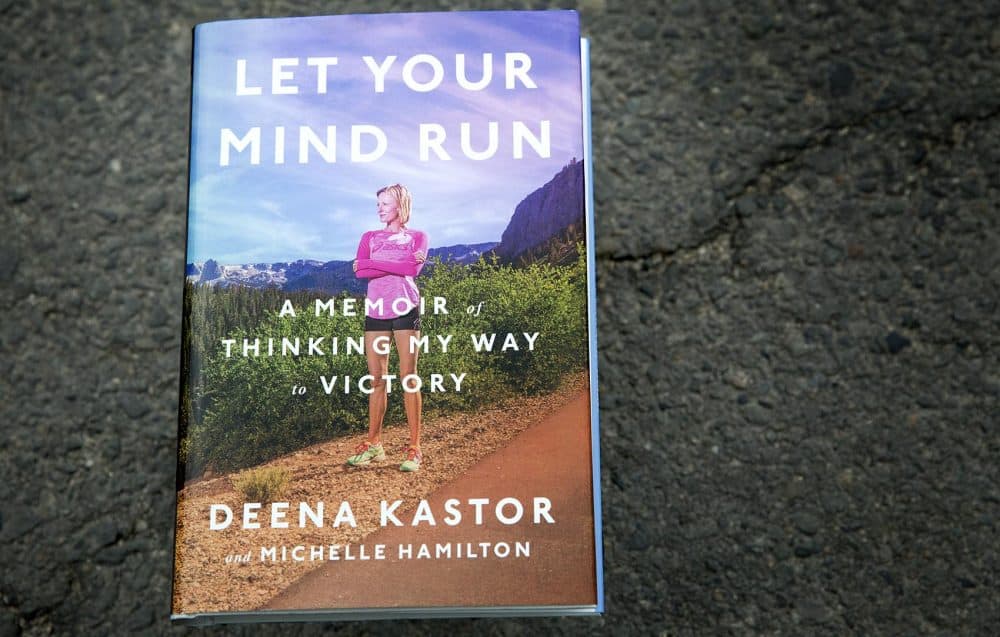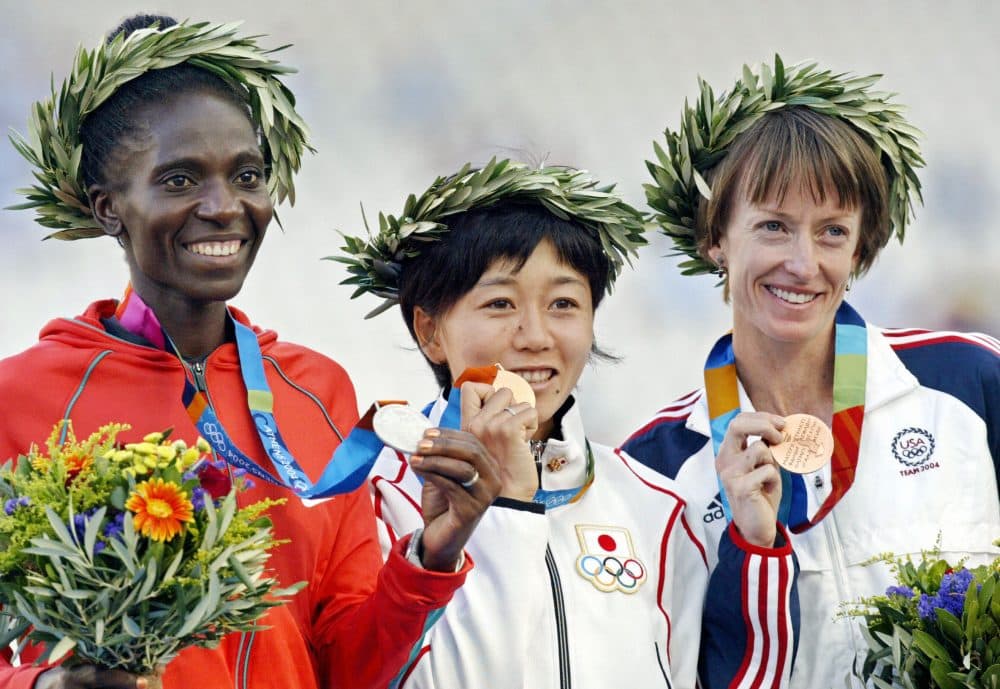Advertisement
Olympic Marathoner Deena Kastor On The Art Of Positive Running
Resume
Deena Kastor is one of the top distance runners in American history, and will be running the Boston Marathon on Monday at the age of 45.
Kastor holds the American record for women in the marathon. In 2004, she won the bronze medal at the Olympics in Athens. But setting records and winning that medal took more than brutal physical training — she had to change the way she approached the sport mentally.
Kastor writes about those changes in a new memoir, "Let Your Mind Run." Here & Now's Alex Ashlock speaks with Kastor (@DeenaKastor) about the book, and how positive thinking helped transform her running career and life.
- Scroll down to read an excerpt from "Let Your Mind Run"
Interview Highlights
On discovering her love of running
"I started running when I was 11 years old, and stumbled on it after failing miserably in so many other sports. I played soccer on my dad's soccer team, running around the field like a swarm of bees with the other kids, and finally scored a goal. But it happened to be for the other team, because I didn't realize we'd switched directions at the halftime. We moved on to softball, where it was terribly boring, and I would rather make dandelion necklaces in the outfield than have anything to do with the bat and ball that's required. Furthermore, I don't have much coordination, which was very apparent after I moved into ice skating, and my instructor said I was too skinny to be graceful anyway. So at the point where my parents were trying to put me in sports to boost my self-esteem to give me people to look up to in various sports, it was crushing my self-esteem. Until I found running.
"I was let loose into the Santa Monica Mountains on the first day of practice, and I never wanted to turn back. It was just this love affair of exploration and joy of the twists and turns, and the rattlesnakes, and the brush and the smells, aromas of licorice and sage and eucalyptus. It was just heaven from the very first day."
"As soon as I realized I was using negative words — 'don't' and 'give up' — I switched it to 'maintain contact,' because that's actually what I wanted out of my body."
Deena Kastor
On fear and anxiety as motivating factors
"I had a pretty good running streak when I was younger, and constantly, after races, parents and coaches [were] telling me that I was talented, and when you hear that enough, I think you subconsciously lose the connection between training and performance. So that was never clear to me, and I ended up losing a lot more in college. And once I felt defeated and frustrated and thinking that, 'The person with the most talent is winning, and that's not me, so maybe I'm burnt out, maybe I used up all of my talent resources,' and thought maybe it was time to move on from the sport.
"I think I just felt frustrated and defeated. And when you're running with anxiety and tension, your body's not operating at its best. So I was injury prone and in a cycle of injuries, and desperately wanted to get away from it."
On what brought her back to running
"Luckily I had conversations with other coaches that knew that they hadn't seen the best of me, knew that I had a fire in me when I started college, and it seemed to fade out towards the end, and that maybe I just needed a change of environment. And it landed me with a phone conversation with coach Joe Vigil in Colorado, and in five minutes he completely unraveled everything I knew about running. He never mentioned talent or winning — everything in his vocabulary was about adaptation, training principles, living an athlete's lifestyle. With just a week prior, I thought, 'I've been running all my life, and I want to try something new, discover a new passion,' and right there I thought, 'I've been running my whole life, and I know nothing about what makes this sport. I don't know why I lose and why I win.' And I set out to discover that, trying to make the best choices. So I packed my bags immediately and moved out to be with coach Vigil, because I knew under him I could I could have the growth that I was seeking.
"I think the joy was brought back the second I felt potential build in me, that I stopped thinking that I was burnt out and defeated, to feeling like, 'Wow, I have so much to learn and so much to grow upon.' "

On strategies she's learned for dealing with setbacks, in running and in life
"I think the whole point in my book ... was trying to show that mental evolution of the past two decades of my career. How, as soon as I started looking at how a shift in my thinking could shift the physical effort that I was in. Instead of 'don't give up,' I changed it to 'maintain contact.' And when my mind was in 'don't give up,' when that was my mantra in my head, I was just fading off this pack, and as soon as I realized I was using negative words — 'don't' and 'give up' — I switched it to 'maintain contact,' because that's actually what I wanted out of my body, and by telling my body what I wanted it to do, not what I didn't want it to do, I felt a complete energy shift in my body, and I pulled forward and latched back onto the group ahead of me.
"So these were discoveries that were so profound. And then we moved to gratitude lists, and imagery, and positive affirmations and all these things that were transforming my running in such a big way, but in the end, ended up transforming me and enabling me to really deal with setbacks in running a lot more easier, and also in life."
Book Excerpt: 'Let Your Mind Run'
By Deena Kastor and Michelle Hamilton
Running seemed fail-proof. There were no tryouts, no one was cut, everyone participated and got a ribbon. Most kids started with the sprints, but my mom ruled them out because a few girls in the valley were already racing at a national level, including future Olympian Marion Jones. Ever protective, my mom thought if I got clobbered in the sprints, my self--esteem would plummet, so she had me join the distance-running group.
My dad drove us all to the track on the first day. I was braiding Lesley’s hair when we pulled in to the school and the chaotic scene caught our attention. Kids were jumping into sandboxes, arching over bars, falling into big blue mattresses. Coaches were shouting and pointing and clapping. My mom, with a plush stadium cushion in one hand and my sister’s hand in the other, made a beeline toward the bleachers. I followed my dad, who had offered again to be a volunteer coach. We scanned the field to find the distance team and were eventually directed to a group of about eight boys and girls huddled around head coach Sal Pratts.
Coach Pratts was a big personality stuffed into a short, strong frame. “Today’s warm-up is a half mile on the track, then five minutes on the trail,” he said.
Wary of doing something wrong, I asked, “How many laps is a half mile?”
“Two,” he said.
My dad held up two fingers.
“Where’s the trail?”
Coach Pratts started to give me directions, but then said, “Just follow Noelle, if you can keep her in your sights.”
Noelle was tall and leggy, with short, curly brown hair and big white teeth highlighting a friendly smile. We hit the track. Noelle had been running for a few years and her experience showed, but I found I could keep up with her. This was a relief; I just had to watch her to know what to do.
Our half mile complete, I followed Noelle out the gate. The school abutted the foothills of the Santa Monica Mountains, and we followed a dusty trail a short way into the hills. I looked up and was taken aback. The land was open and wild. There were fields of dry grasses and chaparral broken only by large arching oak trees. Rattlesnakes hidden in yellow flowering brush shook their tails, and horses grazed in the fenced-off meadows. I’d seen the mountains on the drive to the mall and thought they were pretty, but never knew you could go into them. When it was time to turn around, I didn’t want to.
I loved running right from the start. It was simple and fun. It lacked rules and structure. There was no equipment to fuss with, no technique to learn. While the kids on the infield waited for their turn to jump or throw, Noelle and I and the other kids ran single file on the dusty cinder track. I remember thinking how lucky we runners were to be in constant motion. We were part of the action all the time. Running was also, to my surprise and delight, both solitary and social. One minute I was dashing down the track as if by myself on the side of the hill. The next, I was whipping around and making funny faces, trying to make my teammates laugh.
Best of all, running didn’t make me feel foolish or ridiculous, like I’d done something wrong. The ease of it made me feel competent and free. Everything we were asked to do, I could do. I ran and counted my laps. I warmed up on the trails, happily shooting out the gate with my teammates to the wild open space, and ran among the rabbits and deer. Sometimes, Coach Pratts let us run through the neighborhood. We stretched across the whole street, a pack of scrawny kids exploring manicured suburbia, unfettered, adventurous, going where none of the other kids got to go.
Excerpted from the book LET YOUR MIND RUN by Deena Kastor and Michelle Hamilton. Copyright © 2018 by Deena Kastor and Michelle Hamilton. Republished with permission of Crown Archetype.
This article was originally published on April 13, 2018.
This segment aired on April 13, 2018.
